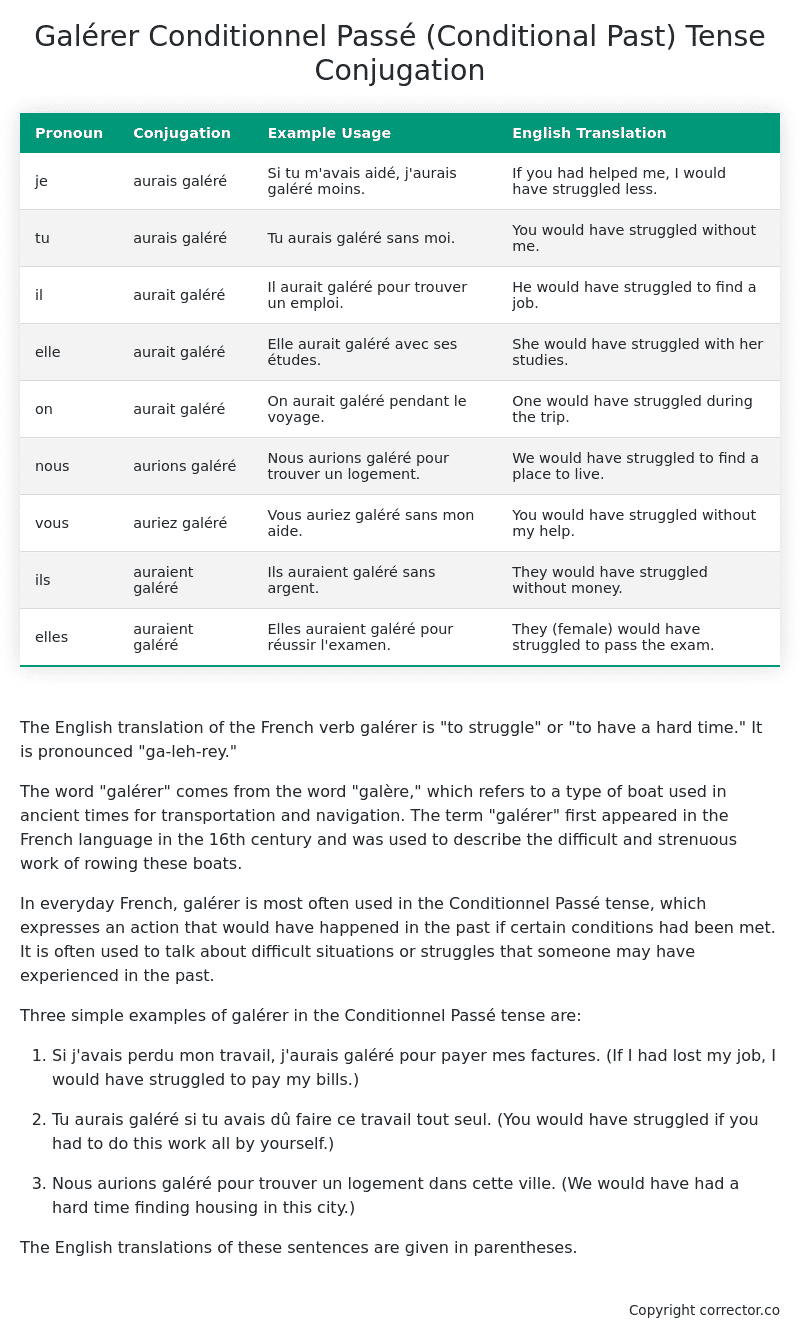Conditionnel Passé (Conditional Past) Tense Conjugation of the French Verb galérer
Introduction to the verb galérer
The English translation of the French verb galérer is “to struggle” or “to have a hard time.” It is pronounced “ga-leh-rey.”
The word “galérer” comes from the word “galère,” which refers to a type of boat used in ancient times for transportation and navigation. The term “galérer” first appeared in the French language in the 16th century and was used to describe the difficult and strenuous work of rowing these boats.
In everyday French, galérer is most often used in the Conditionnel Passé tense, which expresses an action that would have happened in the past if certain conditions had been met. It is often used to talk about difficult situations or struggles that someone may have experienced in the past.
Three simple examples of galérer in the Conditionnel Passé tense are:
-
Si j’avais perdu mon travail, j’aurais galéré pour payer mes factures. (If I had lost my job, I would have struggled to pay my bills.)
-
Tu aurais galéré si tu avais dû faire ce travail tout seul. (You would have struggled if you had to do this work all by yourself.)
-
Nous aurions galéré pour trouver un logement dans cette ville. (We would have had a hard time finding housing in this city.)
The English translations of these sentences are given in parentheses.
Table of the Conditionnel Passé (Conditional Past) Tense Conjugation of galérer
| Pronoun | Conjugation | Example Usage | English Translation |
|---|---|---|---|
| je | aurais galéré | Si tu m’avais aidé, j’aurais galéré moins. | If you had helped me, I would have struggled less. |
| tu | aurais galéré | Tu aurais galéré sans moi. | You would have struggled without me. |
| il | aurait galéré | Il aurait galéré pour trouver un emploi. | He would have struggled to find a job. |
| elle | aurait galéré | Elle aurait galéré avec ses études. | She would have struggled with her studies. |
| on | aurait galéré | On aurait galéré pendant le voyage. | One would have struggled during the trip. |
| nous | aurions galéré | Nous aurions galéré pour trouver un logement. | We would have struggled to find a place to live. |
| vous | auriez galéré | Vous auriez galéré sans mon aide. | You would have struggled without my help. |
| ils | auraient galéré | Ils auraient galéré sans argent. | They would have struggled without money. |
| elles | auraient galéré | Elles auraient galéré pour réussir l’examen. | They (female) would have struggled to pass the exam. |
Other Conjugations for Galérer.
Le Present (Present Tense) Conjugation of the French Verb galérer
Imparfait (Imperfect) Tense Conjugation of the French Verb galérer
Passé Simple (Simple Past) Tense Conjugation of the French Verb galérer
Passé Composé (Present Perfect) Tense Conjugation of the French Verb galérer
Futur Simple (Simple Future) Tense Conjugation of the French Verb galérer
Futur Proche (Near Future) Tense Conjugation of the French Verb galérer
Plus-que-parfait (Pluperfect) Tense Conjugation of the French Verb galérer
Passé Antérieur (Past Anterior) Tense Conjugation of the French Verb galérer
Futur Antérieur (Future Anterior) Tense Conjugation of the French Verb galérer
Subjonctif Présent (Subjunctive Present) Tense Conjugation of the French Verb galérer
Subjonctif Passé (Subjunctive Past) Tense Conjugation of the French Verb galérer
Subjonctif Imparfait (Subjunctive Imperfect) Tense Conjugation of the French Verb galérer
Subjonctif Plus-que-parfait (Subjunctive Pluperfect) Tense Conjugation of the French Verb galérer
Conditionnel Présent (Conditional Present) Tense Conjugation of the French Verb galérer
Conditionnel Passé (Conditional Past) Tense Conjugation of the French Verb galérer (this article)
L’impératif Présent (Imperative Present) Tense Conjugation of the French Verb galérer
L’infinitif Présent (Infinitive Present) Tense Conjugation of the French Verb galérer
Struggling with French verbs or the language in general? Why not use our free French Grammar Checker – no registration required!
Get a FREE Download Study Sheet of this Conjugation 🔥
Simply right click the image below, click “save image” and get your free reference for the galérer Conditionnel Passé tense conjugation!

Galérer – About the French Conditionnel Passé (Conditional Past) Tense
Formation
Common Everyday Usage Patterns
Expressing Unreal Past Scenarios
Polite Requests or Suggestions
Expressing Doubt or Uncertainty
Interactions with Other Tenses
Conditional Present
Indicative Past Tenses
Conditional Future
Summary
Want More?
I hope you enjoyed this article on the verb galérer. Still in a learning mood? Check out another TOTALLY random French verb conjugation!


